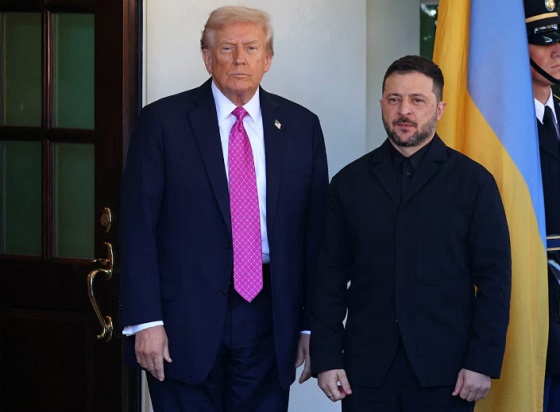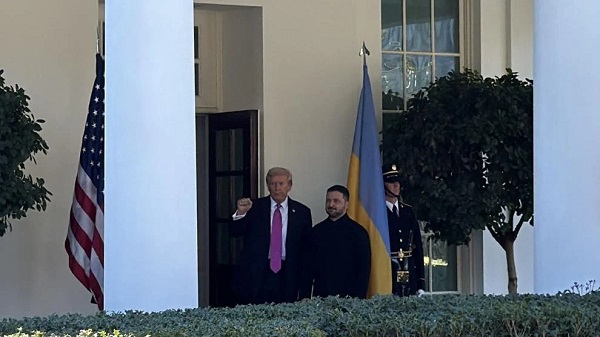Uncategorized
Saudi investment forum opens under haze of Khashoggi’s death

RIYADH, Saudi Arabia — A high-profile economic forum in Saudi Arabia began on Tuesday in Riyadh, the kingdom’s first major event on the world stage since the killing of writer Jamal Khashoggi at the Saudi Consulate in Istanbul earlier this month.
Khashoggi’s death loomed large over the Future Investment Initiative forum and coincided with Turkish President Recip Tayyip Erdogan’s claim Tuesday that Saudi officials murdered Khashoggi in their consulate after plotting his death for days. The Turkish leader demanded the kingdom reveal the identities of all involved in the killing, regardless of rank.
Saudi Arabia, which for weeks maintained Khashoggi had left the consulate, on Saturday acknowledged he was killed there in a “fistfight.” Turkish media and officials say a 15-member Saudi team was flown in to kill Khashoggi and accosted the writer in the consulate, cutting off his fingers before killing and dismembering the 59-year-old Washington Post columnist who wrote critically about Saudi Crown Prince Mohammed bin Salman.
As the Riyadh conference opened, Saudi Energy Minister Khalid Al-Falih described the killing as “abhorrent” in his speech.
The forum kicked off without some of its keynote speakers after numerous Western executives and officials cancelled plans to attend over Khashoggi’s Oct. 2 slaying.
“As we all know, these are difficult days for us in the kingdom of Saudi Arabia,” Al-Falih said to attendees seated in the forum’s ornate hall.
“Nobody in the kingdom can justify it or explain it. From the leadership on down, we’re very upset at what has happened,” he added, referring to Khashoggi’s slaying.
The forum is the brainchild of Prince Mohammed and is aimed at drawing more foreign investment into the kingdom to help create desperately needed jobs for millions of young Saudis entering the workforce in the coming years.
International pressure is mounting against the prince, who did not attend the start of forum. Critics suspect the powerful crown prince ordered Khashoggi’s killing or at the least had knowledge of it.
Despite the absence of key executives and speakers from the United States and other Western partners, some $50 billion in deals were signed Tuesday at the forum with Russian and Asian businesses and officials eager to do business with the kingdom.
“Those partners who are here with us today to continue that journey with us are certainly going to look back and find out … how committed the kingdom is to its partners that stay the course,” Al-Falih said, just moments before several deals were inked on stage.
The forum last year grabbed headlines when Prince Mohammed wowed the crowd of global business titans with pledges to lead the ultraconservative kingdom toward “moderate Islam.” He also announced plans to build a $500 billion futuristic city in the desert.
At the time, Prince Mohammed spoke on stage alongside Stephen Schwarzman of U.S. private equity firm Blackstone.
Schwarzman is among those who’ve backed out of attending this year. Others include U.S. Treasury Secretary Steven Mnuchin, who met with Prince Mohammed separately before the forum, according to Saudi state television.
Among its many investments domestically and abroad, Saudi Arabia’s sovereign wealth fund, which the crown prince oversees, has invested $20 billion in a U.S.-focused infrastructure fund with Blackstone.
The Public Investment Fund has also invested $3.5 billion in ride-sharing firm Uber, whose CEO Dara Khosrowshahi also backed out of attending this year’s forum.
Lubna Olayan, a Saudi businesswoman moderating the forum’s first session Tuesday, opened with remarks about Khashoggi.
“As we gather here in Riyadh this morning, it is natural that our thoughts tend to focus on recent events surrounding the death of Jamal Khashoggi — a writer, a journalist and a Saudi journalist known to many of us,” said. “May he rest in peace.”
She added that such “terrible acts … are alien to our culture and DNA.” Some in the crowd applauded her remarks.
Directors of the Saudi, Russian and United Arab Emirates’ sovereign wealth funds took part in the opening panel. Pakistan’s Prime Minister Imran Khan headlined another session, with Jordan’s King Abdullah expected to speak at the forum on Wednesday.
“I think this conference will open the gateways to Asian and Russian investment in the Saudi economy regardless, irrespective if the crisis gets resolved or not,” said Ayham Kamel of Eurasia Group.
Aya Batrawy, The Associated Press
Uncategorized
CNN’s Shock Climate Polling Data Reinforces Trump’s Energy Agenda


From the Daily Caller News Foundation
As the Trump administration and Republican-controlled Congress move aggressively to roll back the climate alarm-driven energy policies of the Biden presidency, proponents of climate change theory have ramped up their scare tactics in hopes of shifting public opinion in their favor.
But CNN’s energetic polling analyst, the irrepressible Harry Enten, says those tactics aren’t working. Indeed, Enten points out the climate alarm messaging which has permeated every nook and cranny of American society for at least 25 years now has failed to move the public opinion needle even a smidgen since 2000.
Appearing on the cable channel’s “CNN News Central” program with host John Berman Thursday, Enten cited polling data showing that just 40% of U.S. citizens are “afraid” of climate change. That is the same percentage who gave a similar answer in 2000.
Dear Readers:
As a nonprofit, we are dependent on the generosity of our readers.
Please consider making a small donation of any amount here.
Thank you!
Enten’s own report is an example of this fealty. Saying the findings “kind of boggles the mind,” Enten emphasized the fact that, despite all the media hysteria that takes place in the wake of any weather disaster or wildfire, an even lower percentage of Americans are concerned such events might impact them personally.
“In 2006, it was 38%,” Enten says of the percentage who are even “sometimes worried” about being hit by a natural disaster, and adds, “Look at where we are now in 2025. It’s 32%, 38% to 32%. The number’s actually gone down.”
In terms of all adults who worry that a major disaster might hit their own hometown, Enten notes that just 17% admit to such a concern. Even among Democrats, whose party has been the major proponent of climate alarm theory in the U.S., the percentage is a paltry 27%.
While Enten and Berman both appear to be shocked by these findings, they really aren’t surprising. Enten himself notes that climate concerns have never been a driving issue in electoral politics in his conclusion, when Berman points out, “People might think it’s an issue, but clearly not a driving issue when people go to the polls.”
“That’s exactly right,” Enten says, adding, “They may worry about in the abstract, but when it comes to their own lives, they don’t worry.”
This reality of public opinion is a major reason why President Donald Trump and his key cabinet officials have felt free to mount their aggressive push to end any remaining notion that a government-subsidized ‘energy transition’ from oil, gas, and coal to renewables and electric vehicles is happening in the U.S. It is also a big reason why congressional Republicans included language in the One Big Beautiful Bill Act to phase out subsidies for those alternative energy technologies.
It is key to understand that the administration’s reprioritization of energy and climate policies goes well beyond just rolling back the Biden policies. EPA Administrator Lee Zeldin is working on plans to revoke the 2010 endangerment finding related to greenhouse gases which served as the foundation for most of the Obama climate agenda as well.
If that plan can survive the inevitable court challenges, then Trump’s ambitions will only accelerate. Last year’s elimination of the Chevron Deference by the Supreme Court increases the chances of that happening. Ultimately, by the end of 2028, it will be almost as if the Obama and Biden presidencies never happened.
The reality here is that, with such a low percentage of voters expressing concerns about any of this, Trump and congressional Republicans will pay little or no political price for moving in this direction. Thus, unless the polls change radically, the policy direction will remain the same.
David Blackmon is an energy writer and consultant based in Texas. He spent 40 years in the oil and gas business, where he specialized in public policy and communications.
Uncategorized
Kananaskis G7 meeting the right setting for U.S. and Canada to reassert energy ties


Energy security, resilience and affordability have long been protected by a continentally integrated energy sector.
The G7 summit in Kananaskis, Alberta, offers a key platform to reassert how North American energy cooperation has made the U.S. and Canada stronger, according to a joint statement from The Heritage Foundation, the foremost American conservative think tank, and MEI, a pan-Canadian research and educational policy organization.
“Energy cooperation between Canada, Mexico and the United States is vital for the Western World’s energy security,” says Diana Furchtgott-Roth, director of the Center for Energy, Climate and Environment and the Herbert and Joyce Morgan Fellow at the Heritage Foundation, and one of America’s most prominent energy experts. “Both President Trump and Prime Minister Carney share energy as a key priority for their respective administrations.
She added, “The G7 should embrace energy abundance by cooperating and committing to a rapid expansion of energy infrastructure. Members should commit to streamlined permitting, including a one-stop shop permitting and environmental review process, to unleash the capital investment necessary to make energy abundance a reality.”
North America’s energy industry is continentally integrated, benefitting from a blend of U.S. light crude oil and Mexican and Canadian heavy crude oil that keeps the continent’s refineries running smoothly.
Each day, Canada exports 2.8 million barrels of oil to the United States.
These get refined into gasoline, diesel and other higher value-added products that furnish the U.S. market with reliable and affordable energy, as well as exported to other countries, including some 780,000 barrels per day of finished products that get exported to Canada and 1.08 million barrels per day to Mexico.
A similar situation occurs with natural gas, where Canada ships 8.7 billion cubic feet of natural gas per day to the United States through a continental network of pipelines.
This gets consumed by U.S. households, as well as transformed into liquefied natural gas products, of which the United States exports 11.5 billion cubic feet per day, mostly from ports in Louisiana, Texas and Maryland.
“The abundance and complementarity of Canada and the United States’ energy resources have made both nations more prosperous and more secure in their supply,” says Daniel Dufort, president and CEO of the MEI. “Both countries stand to reduce dependence on Chinese and Russian energy by expanding their pipeline networks – the United States to the East and Canada to the West – to supply their European and Asian allies in an increasingly turbulent world.”
Under this scenario, Europe would buy more high-value light oil from the U.S., whose domestic needs would be back-stopped by lower-priced heavy oil imports from Canada, whereas Asia would consume more LNG from Canada, diminishing China and Russia’s economic and strategic leverage over it.
* * *
The MEI is an independent public policy think tank with offices in Montreal, Ottawa, and Calgary. Through its publications, media appearances, and advisory services to policymakers, the MEI stimulates public policy debate and reforms based on sound economics and entrepreneurship.
As the nation’s largest, most broadly supported conservative research and educational institution, The Heritage Foundation has been leading the American conservative movement since our founding in 1973. The Heritage Foundation reaches more than 10 million members, advocates, and concerned Americans every day with information on critical issues facing America.
-

 Business2 days ago
Business2 days agoFord’s Whisky War
-

 Agriculture24 hours ago
Agriculture24 hours agoIs the CFIA a Rogue Agency or Just Taking Orders from a Rogue Federal Government?
-

 Focal Points2 days ago
Focal Points2 days agoTrump Walks Back His Tomahawk Tease from Zelensky
-

 Business1 day ago
Business1 day agoTrump Blocks UN’s Back Door Carbon Tax
-

 Business1 day ago
Business1 day agoJudges are Remaking Constitutional Law, Not Applying it – and Canadians’ Property Rights are Part of the Collateral Damage
-

 Red Deer1 day ago
Red Deer1 day agoYour last minute election prep: Common Sense Red Deer talks to the candidates
-

 Automotive2 days ago
Automotive2 days ago$15 Billion, Zero Assurances: Stellantis Abandons Brampton as Trudeau-Era Green Deal Collapses
-

 Daily Caller1 day ago
Daily Caller1 day agoTrump urges Putin, Zelenskyy to make a ‘deal’






